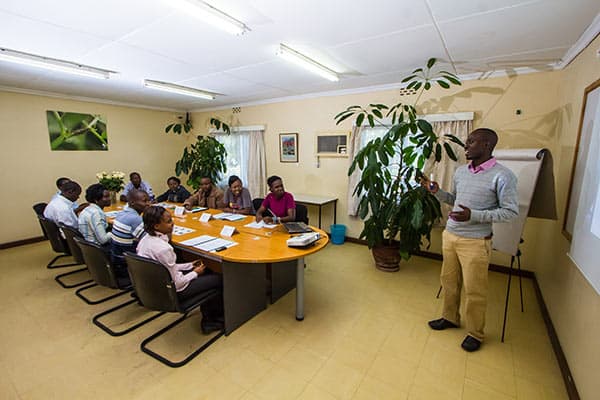The modern farmer must be well equipped to comply with market standards as well as meet the numerous challenges posed by the ever-changing agri-business landscape. Dudutech Training Department provides training and information on Good Agri-Practices aimed at giving its clients practical skills, knowledge and confidence to make ecologically, socially and economically sound decisions on crop health. To this end we offer a range of standard as well as tailor-made courses to meet our clients’ specific needs. These can be conducted either centrally at our well appointed Dudutech Training Centre in Naivasha, or on farm, which is logistically favourable to most clients as the workers are not off site for long periods.
Dudutech has been providing training in various aspects of horticultural production since its inception. All these have undergone peer review and accreditation by Kenya Agricultural Research Institute (KARI), the premier parastatal undertaking agricultural research. Dudutech is also accredited as a training provider by NITA. In 2009, Dudutech qualified as a COLEACP/PIP training provider consultant for Kenya and Uganda regions. This is a European Development Fund (EDF) funded project aiming to assist exporters in the ACP (African, Caribbean and Pacific) countries comply with market requirements for food safety and traceability.
Training is a combination of technical work, hands on training and field work. All courses except awareness courses are followed up with written or oral examinations, in English or Swahili. Certificates are issued to all successful participants if they pass their examinations. Dudutech has a set of industry standard courses designed to comply with the various audit standards, and courses to promote good crop husbandry, post harvest management, safe use of chemicals, plant nutirtion, and Integrated Crop Management, for maximum residue level reduction in crops.
Dudutech can also custom build courses designed specially for your company, crop, audit or market requirements.
Dudutech Trainers
Our trainers are all graduates with first-hand practical skills and knowledge in the industry. The trainers are also members of Professional Trainers Association of Kenya (PTAK), the national association dedicated to industrial learning and performance professionals, having undergone training of trainers (TOT) courses. This team is capable of developing and delivering courses to
meet the needs of a wide range of clients.
Accreditations
Our training department is registered by the National Industrial Training Authority (NITA) formerly Directorate of Industrial Training (DIT) as a training service provider under the name Dudutech Integrated Pest Management Ltd.
Training Approach
Dudutech embraces ‘Participatory Learner Centred Approach’ to training and shall apply: topical presentations, demonstrations, group discussions, practical site visits and role plays as appropriate.
Assessing Competence
All our training courses, except awareness courses are examinable. The examinations consist of two main sections:
- Practical skills assessment
- Written examination
Certification
Trainees are awarded certificates of attainment upon passing the examination.


